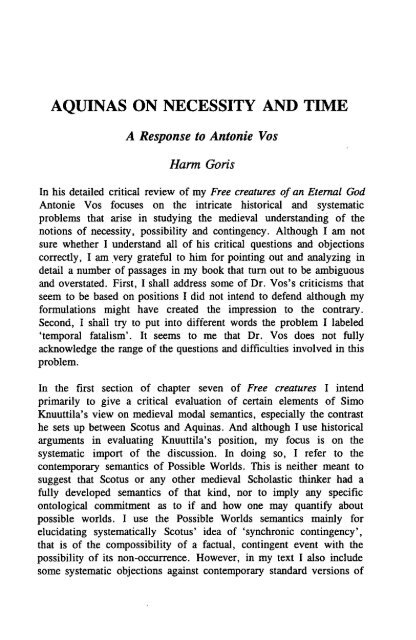Jaarboek Thomas Instituut 1997 - Thomas Instituut te Utrecht
Jaarboek Thomas Instituut 1997 - Thomas Instituut te Utrecht
Jaarboek Thomas Instituut 1997 - Thomas Instituut te Utrecht
You also want an ePaper? Increase the reach of your titles
YUMPU automatically turns print PDFs into web optimized ePapers that Google loves.
AQUINAS ON NECESSITY AND TIME<br />
A Response 10 Antonie Vos<br />
Harm Goris<br />
In his detailed critical review of my Free creatures of an E<strong>te</strong>rnal God<br />
Antonie Vos focuses on the intrica<strong>te</strong> historical and sys<strong>te</strong>matic<br />
problems that arise in studying the medieval understanding of the<br />
notions of necessity, possibility and contingency. Although I am not<br />
sure whether I understand all of his critical questions and objections<br />
correctly, I am very gra<strong>te</strong>ful to him for pointing out and analyzing in<br />
detail a number of passages in my book that tum out to be ambiguous<br />
and oversta<strong>te</strong>d. First, I shall address some of Dr. Vos's criticisms that<br />
seem to be based on positions I did not in<strong>te</strong>nd to defend although my<br />
formulations might have crea<strong>te</strong>d the impression to the contrary.<br />
Second, I shall try to put into different words the problem I labeled<br />
'<strong>te</strong>mporal fatalism'. It seems to me that Dr. Vos does not fully<br />
acknowledge the range of the questions and difficulties involved in this<br />
problem.<br />
In the first section of chap<strong>te</strong>r seven of Free creatures I in<strong>te</strong>nd<br />
primarily to give a critical evaluation of certain elements of Simo<br />
Knuuttila's view on medieval modal semantics, especially the contrast<br />
he sets up between Scotus and Aquinas. And although I use historical<br />
arguments in evaluating Knuuttila's position, my focus is on the<br />
sys<strong>te</strong>matic import of the discussion. In doing so, I refer to the<br />
con<strong>te</strong>mporary semantics of Possible Worlds. This is neither meant to<br />
suggest that Scotus or any other medieval Scholastic thinker had a<br />
fully developed semantics of that kind, nor to imply any specific<br />
ontological commitment as to if and how one may quantify about<br />
possible worlds. I use the Possible Worlds semantics mainly for<br />
elucidating sys<strong>te</strong>matically Scotus' idea of 'synchronic contingency',<br />
that is of the compossibility of a factual, contingent event with the<br />
possibility of its non-occurrence. However, in my <strong>te</strong>xt I also include<br />
some sys<strong>te</strong>matic objections against con<strong>te</strong>mporary standard versions of








